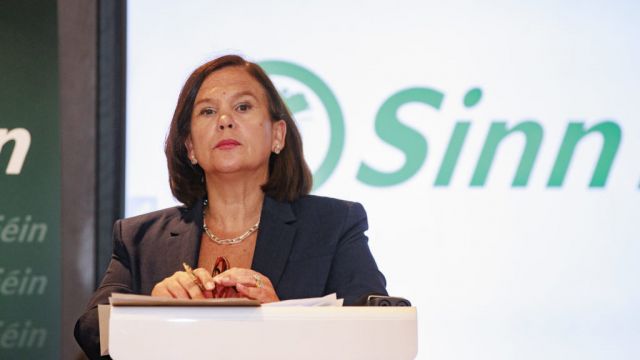The Government's approach in choosing locations to accommodate international protection applicants has been "arbitrary" and "driven by private provision", Sinn Féin leader Mary Lou McDonald has said.
Ms McDonald criticised the Coalition's handling of the issue as her party unveiled its own plan, laying out how a Sinn Féin government would accommodate those seeking asylum in the State.
Publishing the plan on Tuesday, the Sinn Féin leader said accommodation centres for international protection applicants should be located in “better off” areas.
Speaking to RTÉ Radio's Morning Ireland on Wednesday, she reiterated the point, stressing such centres should not be established in communities “that are literally cut to the bone”.
Her comments follow violent scenes in Coolock where gardaí have repeatedly clashed with demonstrators opposed to the proposed use of the former Crown Paints factory on the Malahide Road as an accommodation centre for international protection applicants.
Ms McDonald said Sinn Féin's new immigration policy is distinct from the Government’s approach because "we place not alone human rights and respect for applicants at centre stage, but also respect for and acknowledgement of communities on a par with that".
She added: "Our position is that reception centres should not be located in very, very deprived areas. We believe that is the wrong approach.
"If you look at what the Government has been doing, their approach has been arbitrary. It's been very much ad hoc and driven by private provision."
Ms McDonald said her party is in favour of the State providing accommodation of asylum seekers, but said "it hasn't been planned properly".
"In many cases it has meant that facilities have been opened for very vulnerable cohorts of people in communities that are literally cut to the bone and struggling and not managing as things stand," she said.
Deprivation
Ms McDonald said data, such as the deprivation index or census information, should be used by the Government to inform policy and choices.
"When decisions arbitrarily are taken about the siting of centres, there isn’t then an audit even, a dialogue, a structured engagement or consultation with the community," she said.
Ms McDonald also said the current system for processing the applications of those seeking asylum is too slow, leaving applicants in the "invidious position of being in a very long limbo".
Summarising the new Sinn Féin policy, Ms McDonald explained: "You do not place these centres for very vulnerable cohorts of people who need support in very, very deprived, struggling and neglected areas.
"By the way, neglected by successive governments and for generations, and their neglect is the responsibility of government and government alone, not any newcomer to our shores. Let me make that absolutely clear.
"They are not appropriate locations for these centres and services. We can objectively verify that it shouldn't be an arbitrary thing where centres are located.
"Equally, there still has to be a dialogue and engagement and a consultation with the wider community because, as a matter of basic common sense and good order, where change comes to any neighbourhood, to a community, where new people are introduced, for whatever length of time, the sensible, orderly, friendly, constructive way to go about that is with maximum consultation and conversation, not the approach of the Government, which has been to ignore all of that."
She said community is "at the heart of our approach", adding: "It's about living in the real world and recognising people's lived realities. It's about getting the system right in a way to protect our social cohesion and to have a system that enjoys public confidence."
Ms McDonald denied Sinn Féin's approach would give communities a veto. "Communities aren't looking for vetoes. Communities are looking for fair play, for fairness, for common sense, and for their voices to be heard," she added.
"I don't think anybody in any community, be it affluent or otherwise, would deny the rights of people to comment, to object, to participate in our planning system. There's no suggestion that anybody has a veto in that system. It's an open democratic process.
"The same standards, the same respect, the same conversation, and democratic engagement has to exist when it comes to introducing and developing these standards."







